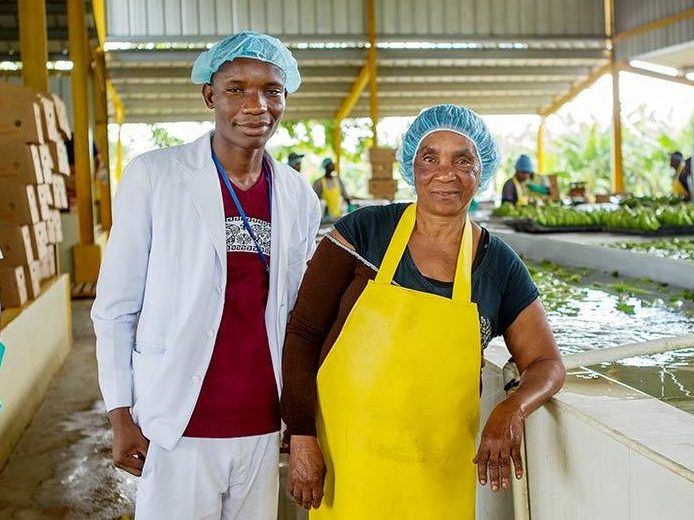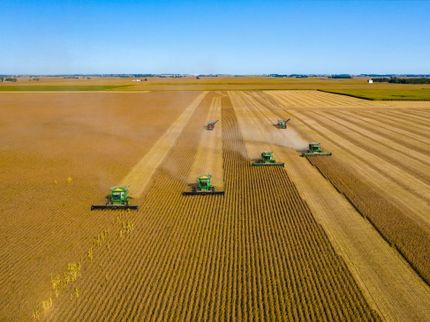Fairtrade Launches Consultation on Living Wages for Banana Workers
Have your say on our plans to make a living wage a reality for all workers on Fairtrade certified banana plantations
Fairtrade International is launching a public consultation on a model to enable banana plantation workers to earn a Living Wage. We are inviting all relevant stakeholders, including workers, plantation owners, retailers and traders to take part so that, together, we can make Living Wages a reality for all workers on Fairtrade certified banana plantations.

Jacques Antoine (left) works at BANAFEM, a Fairtrade certified banana plantation in the Dominican Republic. With his earnings he’s putting himself through university to reach his goal of becoming a doctor.
Image © Erika Santelices
Inadequate wages remain a reality for many banana workers
One of the most pressing and unresolved challenges for the banana sector remains ensuring a Living Wage for banana workers. In many producer countries, workers are paid the national legal minimum wage. But this is often far below what is needed for workers to have a decent standard of living – enough to feed their families, enjoy safe housing, send their children to school, afford adequate healthcare and put some aside for emergencies.
In addition, the COVID-19 pandemic has increased the insecurity and vulnerability of millions of agricultural workers worldwide, including those working on Fairtrade certified banana plantations. In response, Fairtrade has established the Fairtrade Producer Relief Fund and Fairtrade Producer Resilience Fund to support both producers and workers - but in the long term, a Living Wage is the best way to ensure workers can provide for their families.
Fairtrade makes a difference – but there is still a long way to go
For many years and in many countries, there has been no agreed Living Wage for agricultural workers. Fairtrade, as a founder member of the Global Living Wage Coalition, has been working to change this by settings Living Wage benchmarks - including for banana producing countries. Based on the Anker methodology, the benchmarks tell us the estimated wages needed to cover the basic needs of workers and their families, including food, clothing, shelter, healthcare, education, transport to work and a little extra for unforeseen circumstances.
In some countries, such as Colombia and Ecuador, banana workers are already earning, or are close to earning living wages. In others, there is still some way to go. Over the years, the Fairtrade Premium has offered economic support to millions of farmers and workers through low-interest loans, subsidized medical care, scholarships and cash payments. Despite this, the Premium is not intended to replace a Living Wage that workers can count on. This is why Fairtrade wants to go further. Enabling banana workers to earn a Living Wage is one of the core objectives of Fairtrade’s strategy.
What Fairtrade is proposing
Fairtrade wants to ensure that all certified banana plantations compensate workers fairly, whilst recognizing that buyers and retailers also have a role to play in sharing enough value with producers. Here’s what we’re proposing:
A compulsory Fairtrade Base Wage: Starting in mid-2021 at least 70 percent of the cash amount to reach a living wage must be paid to all workers at Fairtrade banana plantations. This amount will rise to 75 percent in 2023. Every Fairtrade banana worker will get at least the base wage, even if the legal minimum wage is lower. If they already receive more, their wages can’t be lowered.
Fairtrade Premium: As a temporary measure to close the gap, up to 30 percent of the Fairtrade Premium must be paid out as a cash bonus, on top of the existing, optional 20 percent that can be paid out in cash if workers chose so. Depending on local tax rules, workers may choose to receive the Premium bonus in vouchers, instead of cash.
A negotiated plan towards Living Wages: We believe collective bargaining is the most economically sustainable and socially empowering approach to reach a Living Wage, both for workers and their employers. Fairtrade’s Hired Labour Standard already requires wages to increase over time to reach a living wage. So, after applying the Fairtrade Base Wage, employers must negotiate with trade unions or other elected workers’ representatives about timelines and steps to bridge the remaining gap. These timelines may depend on the company’s financial position, but wages should always be increased above inflation to make sure that the gap is narrowed and ultimately closed.
Take part!
Our proposal to improve wages for banana workers depends on commitment and collaboration between actors across the supply chain. We need to know what you think. Public consultation is open until the end of September 2020, and we aim to approve the new Standard by the end of 2020, coming into effect in mid-2021.































































